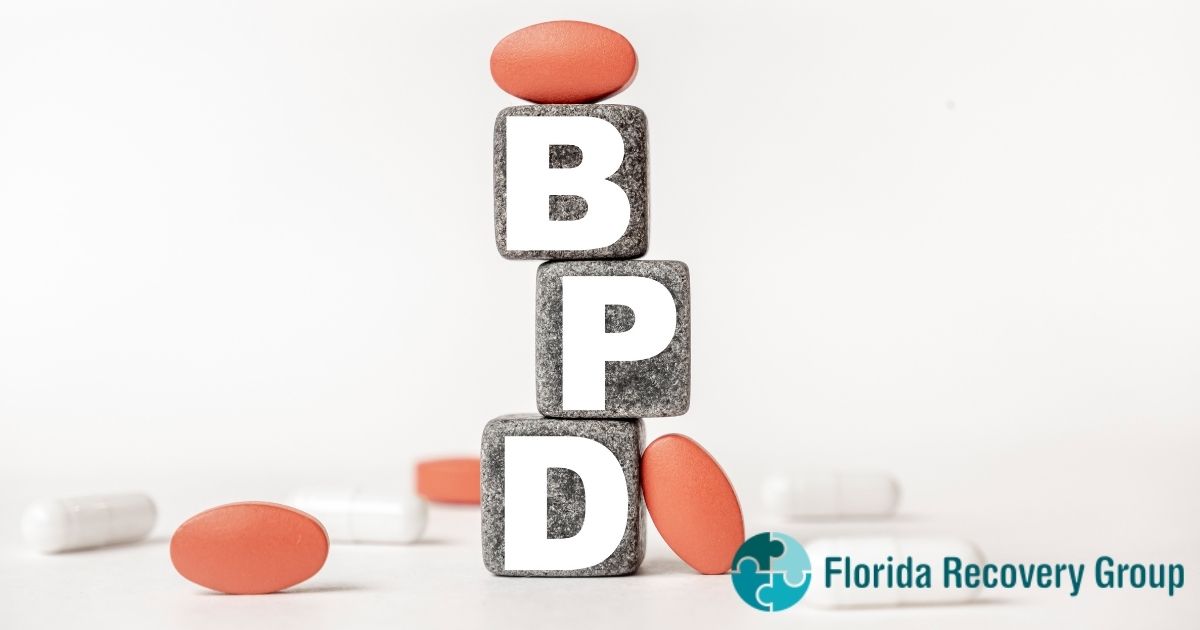
14 Sep Symptoms and Treatment of Borderline Personality Disorder and Substance Abuse
Borderline personality disorder (BPD) is a mental health condition that causes an individual to experience distorted self-perception and extreme mood swings. Researchers estimate that up to 78% of individuals with borderline personality disorder also suffer from a substance use disorder.[1]
Individuals who suffer from both BPD and addiction may be less stable and more prone to impulsive behaviors, making it difficult to stay sober. However, with an individualized dual diagnosis treatment program, individuals can recover from addiction and learn to manage their symptoms of BPD.
What is Borderline Personality Disorder (BPD)?
Borderline personality disorder is characterized by unstable relationships, intense emotions, a distorted self-image, and impulsive behaviors. When left untreated, the symptoms of BPD will severely impact an individual’s ability to function in everyday life. Individuals with BPD tend to see things in black and white, making compromises and negotiations extremely challenging. This can make maintaining healthy relationships very difficult.
Additionally, borderline personality disorder causes impulsive behaviors, such as spending too much money, reckless driving, and unsafe sex. Symptoms of impulsivity may contribute to substance abuse, eventually leading to addiction.
Causes of BPD
Several factors are known to contribute to the development of BPD. Someone suffering from a borderline personality disorder may experience one or all of the following factors:[2]
- Brain chemistry – Studies have found that some people with BPD have different levels of neurotransmitters in their brains than the average person. These neurotransmitters include serotonin, noradrenaline, and dopamine, which are responsible for emotion and impulse regulation.
- Genetics – Many individuals with BPD have family members who suffer from this mental health condition as well, indicating that genetics may be a factor.
- Early/childhood environment – Individuals who grew up in an unstable or abusive environment, had unstable or addicted parents, or suffered from childhood trauma are more likely to develop BPD.
- Neurological factors – Research has found that some individuals with BPD have some of their brains that are abnormal or small. This is found in the part of the brain that controls mood and behavior.
Many of the causes of borderline personality disorder are also known causes of substance abuse and addiction.
Signs and Symptoms of BPD
The common symptoms of BPD include:
- Suicidal ideation and acts
- Extreme and frequent mood swings
- Paranoia
- Bouts of extreme anger or aggression
- Intense fear of being alone
- Codependency
- Impulsivity
- Episodes of extreme depression and anxiety
The Relationship Between Borderline Personality Disorder and Substance Abuse
BPD and substance abuse often come hand in hand. With that being said, many individuals with BPD will suffer from addiction or substance abuse at some point in their lives.
One of the main reasons that these conditions co-occur often is because individuals with borderline personality disorder tend to attempt to self-medicate their symptoms. Because their moods can be so extreme and drastic, using drugs to numb themselves may seem like an attractive idea. Unfortunately, this only tends to exacerbate symptoms in the long run.
Both BPD and addiction share similar symptoms, such as unstable relationships, self-destructive or impulsive behavior, and drastic mood swings. Because of overlapping symptoms, these conditions can be difficult to diagnose.
Unfortunately, treating BPD and addiction can be difficult. This is because the two conditions exacerbate the symptoms of one another, making the effects of this dual diagnosis more severe in general. As a result, many individuals do not complete treatment. However, it is possible to recover from both conditions with a comprehensive dual diagnosis treatment plan.
Treating Borderline Personality Disorder and Addiction
The most effective treatment for borderline personality disorder is dialectical behavior therapy (DBT). This type of therapy uses mindfulness techniques to help patients improve distress tolerance, emotional regulation skills, impulse control, and interpersonal functioning.
It is important to note that patients must be treated for their BPD and substance use disorder simultaneously, otherwise the symptoms of one condition may trigger the other to worsen. Thankfully, DBT is easily integrated into addiction treatment procedures like group therapy and motivational interviewing (MI), which are both evidence-based therapies that are highly successful in the treatment of addiction.
Additionally, a treatment method has been developed specifically for the treatment of comorbid BPD and addiction. It is a type of DBT known as DBT-SUD. DBT-SUD uses a group format of dialectical behavior therapy and includes additional skills intended to prevent the recurrence of substance abuse behaviors. Research has found that this form of treatment is highly effective in treating the co-occurrence of BPD and addiction.[3]
Comprehensive Addiction Treatment at Florida Recovery Group
If you or a loved one suffer from addiction, we can help. We only use evidence-based therapies and proven methods of treatment, create an individualized treatment plan based on your specific needs, and treat both your mental health condition and addiction simultaneously. We take pride in providing our patients with the best foundation of recovery for a lifetime of sobriety and happiness. Contact us today for more information on our treatment program in Delray Beach.
References:





